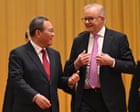
The world stage is abuzz with renewed diplomatic engagements as nations move towards fostering stronger relationships and cooperation. Two significant developments highlight this evolving narrative: the successful visit of Australian Prime Minister Anthony Albanese to China, and the call for strategic alignment among the United Kingdom, Germany, and France by German Chancellor Friedrich Merz.
In a noteworthy diplomatic effort, Australian Prime Minister Anthony Albanese recently concluded a fruitful six-day visit to China, marking a pivotal turn in Australia-China relations. This trip, which included discussions with Chinese President Xi Jinping and several successful business events, was hailed as a diplomatic triumph, reminiscent of past landmark visits. Local media enthusiastically highlighted the positive shift, noting that previous icy tensions seemed to be warming considerably, at least for the foreseeable future. The visit underscored a mutual interest in strengthening economic and cultural exchanges, signaling a hopeful era of bilateral cooperation.
Simultaneously, across the globe, a different kind of diplomatic collaboration is being crafted. German Chancellor Friedrich Merz has called for a strategic alliance between the UK, Germany, and France, focused on addressing pressing issues such as illegal migration and enhancing defense strategies. This initiative was unveiled at an historic moment marked by the signing of the Kensington treaty, the first formal agreement between the UK and Germany since World War II. This accord lays the foundation for collaborative efforts in multiple domains, including security, trade, and education.
The treaty’s significance is further underscored by its comprehensive scope. It not only articulates a shared recognition of mutual threats, such as Russia, but also outlines plans for joint procurement and development of defense technologies. These include endeavors surrounding Typhoon jets, Boxer vehicles, and long-range missiles, demonstrating a commitment to bolstering defense capabilities. Furthermore, the treaty fosters cultural ties through expanded school exchange programs and establishes a joint rail taskforce to explore potential infrastructure projects, such as future rail links between London and Berlin.
Both these diplomatic engagements reflect an underlying trend towards collaboration and unity among major global players. Australia’s warming relationship with China and the emerging strategic axis among European powers highlight a commitment to peaceful dialogue and shared progress. These initiatives promote not only immediate diplomatic achievements but also pave the way for enduring partnerships capable of addressing complex global challenges.
As these nations build bridges through diplomacy, the international community watches with cautious optimism. The efforts of leaders like Albanese and Merz set a positive precedent, reminding us of the power of diplomatic engagement in fostering global peace and prosperity. This renewed focus on collaboration over confrontation encourages a vision of a world where cooperation becomes the norm, guiding nations toward collective solutions to shared problems.
In these times of geopolitical shifts, such developments offer hope and assurance, instilling confidence in the possibility of a harmonious global future driven by dialogue and cooperation. The recent diplomatic advances demonstrate that through mindful leadership and strategic partnerships, the path forward can be both prosperous and peaceful.
Source: {link}
